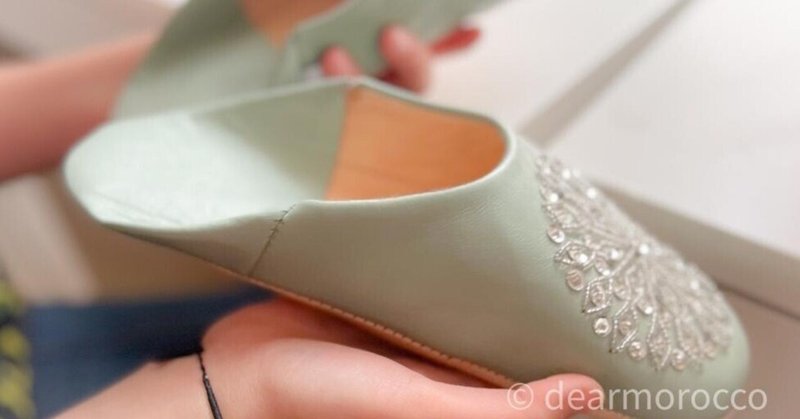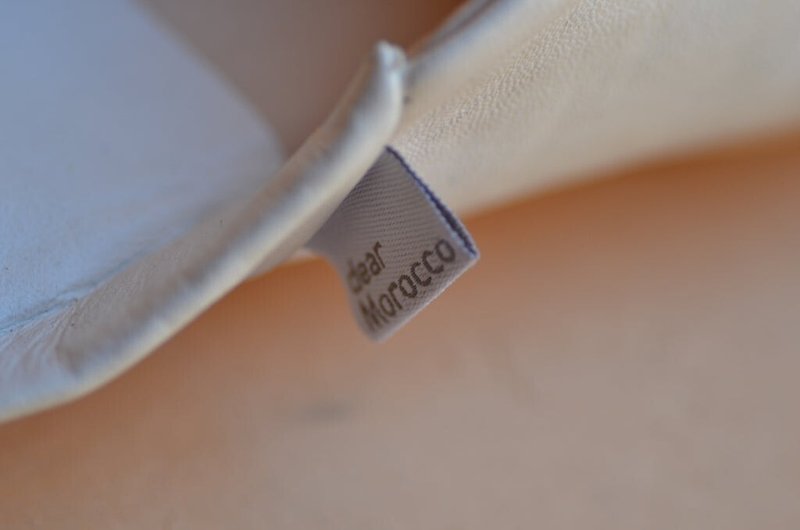
Our Story of Babouche
My first trip to Morocco was in 1999
when I was 23 years old. During my university break, I traveled to various countries, but one day while traveling through Europe, I had an idea to visit the African continent. So, a friend and I took a ferry boat from Spain to Morocco.
During our trip, we visited the famous blue and white walls of Chefchaouen, Fez, and crossed the Atlas Mountains to reach the desert. However, I ended up injuring my foot and had an unexpected long stay in a town near the Sahara desert.
Even after returning home, I couldn't forget about the black-clothed women I met and the culture of southern Morocco. I decided to make multiple trips to Morocco to research their way of life and write my graduation thesis on it.
Travel was more affordable back then, it still required significant resources. So, I started selecting Moroccan handmade goods to sell in Japan and began an online business. In Tokyo 20 years ago, Moroccan goods were still quite rare, and to my surprise, my small online shop received more orders than I expected.
Many of my customers were professionals in the interior design and decor industry, such as shop buyers, designers, and architects. One of my customers asked me if I would be interested in wholesale, which prompted me to start offering wholesale services (at the time, I was a complete amateur and didn't even know the terms "markup" and "cost price").
After graduating from university, I worked at an internet portal site during the day and managed my own shop business in the evenings. However, my business started to get busier and I began to think about living in Marrakech while handling even more items. Around this time, I was given the opportunity to write articles about Morocco for the website "All About Japan," which provided me with a regular income and was the trigger for my move to Morocco.
At the age of 25, I moved to Marrakech and founded a company
launching full-scale retail and wholesale operations.At that time, the products we were dealing with were carpets, lampshades, baskets, and babouches. However, the babouches were the most popular item we sold. Initially, we sold babouches that we bought from the souk, but back then, the babouches sold in Marrakech souks only came in primary colors. The round-toed type that was popular with our Japanese customers was considered a "souvenir" item, and it was challenging to find good quality ones among the ones with low-quality leather, cardboard used underneath, or those that had mold or discoloration issues.
Once we were able to sell a significant amount of babouches, we decided to order original babouches from local craftsmen. However, the finished products would come in completely different colors, wrinkled leather, and that more than half of them would be of unsellable quality.
Therefore, we gathered trustworthy craftsmen and started producing completely original babouches under the name of "dear Morocco."

We have been designing and selling babouches for over 20 years,
and there are several things we keep in mind when making them.
The Beauty of Design:
We believe that indoor slippers deserve the same level of attention as outdoor footwear, with colors and designs that fit each individual's style and complement their home decor when displayed at the entrance. Our collection includes a range of designs, from cute and playful to sleek and minimalistic. The color schemes and patterns are inspired by traditional Moroccan embroidery and motifs, personally curated by me.Quality materials
As mentioned previously, many of the slippers sold in the souks (markets) are low-quality and quickly fall apart. However, we strive to use high-quality sheepskin to create slippers that only become more beautiful with use. Although our slippers may come with a higher price tag than typical slippers, we hope that the use of genuine leather and the artisanal process involved in crafting each pair makes it a small luxury for our customers to enjoy.Sustainable production
Sheep meat is the most commonly consumed meat in Morocco, and our babouche slippers are made from the skins of sheep raised by small to medium-sized oasis farmers who practice sustainable agriculture. Unlike monoculture farming, these oasis farmers cultivate a variety of crops, such as olives, palm trees, fruits, vegetables, herbs, and livestock. Our babouche slippers are not made from sheep raised for the sole purpose of leather consumption.
The embroidery on our babouche slippers is crafted by women who work in their homes during breaks from household chores, while the finishing touches are completed by skilled artisans who have been making babouche for generations. The finished products are then brought to our workshop where specialized quality control staff inspect each pair, removing minor stains and fixing loose threads before they are packed and sent to our customers. Although the handmade process takes longer, it provides employment opportunities for many individuals and contributes to a sustainable production cycle.

The brand name "Dear Morocco"
was chosen because when I first became interested in Morocco, the image of Morocco in Japan was not very positive, and even when there was something positive, it was only the beautiful desert. I wanted to introduce the wonderful country of Morocco more, not just through words, but also by making people feel closer to Morocco through lovely products.
Babouche, or indoor slippers, is not a piece of furniture that requires a big decision-making process or a large carpet that dramatically changes the impression of the room. Rather, they are small supporting roles that are not often noticed, but are used every day. I hope that they can be cherished as an important part of everyday life, like a mug that one uses to relax after coming home.
I lived in Marrakech from 2001 to 2016, selling Moroccan goods to customers around the world. In 2016, I moved to Berlin, Germany, for my children's education, but I still go to Tokyo and Marrakech to continue making products with the Marrakech staff.
While this website mainly sells products to individual customers, if you are interested in wholesale, please feel free to contact us. It would be our pleasure to help you have a wonderful encounter with Moroccan goods.
IF YOU ARE LOOKING FOR OUR PRODUCTS…FOR WHOLESALE

IF YOU ARE LOOKING FOR OUR PRODUCTS…FOR YOURSELF
この記事が気に入ったらサポートをしてみませんか?
